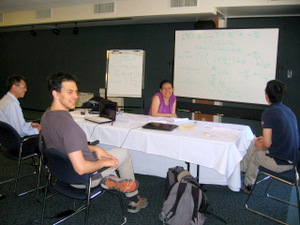Mathematics Research Communities - 2012
"Overall, I enjoyed it immensely; I feel I became stronger as a mathematician, and I got a chance to meet and work with some amazing people. Thank you!"
The 2012 Mathematics Research Communities (MRC) summer conferences were held at the Snowbird Resort in Utah, June 10-30. The four week-long conferences drew 119 early-career mathematicians. These conferences, funded by the National Science Foundation, are part of the AMS program that will include special sessions at the Joint Mathematics Meetings, a longitudinal study, and a continuation of the connections and collaborations via an electronic network.
More comments from participants:
"I met great people that have the same research interest and I hope to create collaboration groups."
"I loved the conference. I think it might have been my favorite conference experience ever. I feel like I met people here who are going to be my colleagues for the rest of my career. "
"The working group aspect was wonderful. I liked just working on math problems intensively for a week. Very fun!"
This year's conferences:
WEEK ONE
Discrete and Computational Geometry
June 10-16, 2012
Organizers: Satyan Devadoss, Williams College; Vida Dujmovic, Carleton University; Joseph O'Rourke, Smith College; Yusu Wang, The Ohio State University
"That I could meet so many other geometers in my field and of similar interest to talk about research and think on problems --- most workshops and conferences don't offer this level of interaction, even in my field."
"I truly enjoyed the conference. It was very rewarding, we made progress on some open problems, and I made so many connections that I hope to continue."
Discrete geometry is a relatively new focus within pure mathematics, while computational geometry is an emerging area in applications-driven computer science. The field has expanded greatly from its origins, and the new connections to areas of mathematics (such as computational topology) and new application areas (such as mathematical biology) seems only to be accelerating. The fundamentals cover polygons, convex hulls, triangulations, Voronoi diagrams, curves, and polyhedra. And even within this traditional core, many unresolved questions remain. This material is accessible to graduate students at nearly all levels since one needs little background to reach some of the most beautiful and intriguing questions in the field. Moreover, a strong intuition of this subject can be obtained and developed through visualization. Due to the relative youth of the field, there are many accessible unsolved problems, and it is not too much to expect that we will make significant progress on several. This was the heart of this MRC. We closed the workshop by sketching out possible papers, assigning lead writing, and mapping out potential conference and journal venues, along with plans for continuing our work together at future meetings.
"It was amazing to work/share ideas with people from different backgrounds."
WEEK TWO
Partial Differential Equations, Harmonic Analysis, Complex Analysis, and Geometric Measure Theory
June 17-23, 2012
Organizers: Dorina Mitrea, University of Missouri at Columbia; Irina Mitrea, Temple University; Katharine Ott, University of Kentucky
"The very informal setting allowed for more involvement and group collaboration."
This workshop focused on research problems at the interface between Complex Analysis, Harmonic Analysis, PDE, and Geometric Measure Theory. This choice is motivated by the fact that combinations of techniques originating in these fields have proved to be extremely potent when dealing with a host of difficult and important problems in analysis. Topics analyzed at the workshop included boundary value problems for single equations and systems of equations, the Poisson kernel for elliptic systems, and the boundary point principle for the Laplacian. During the workshop, participants had the opportunity to both review classical results and techniques related to these topics, and to research and work on various remaining open problems. The attendees of this research community benefitted by strengthening their background in these areas and by becoming aware of possible new avenues of research and collaboration.
Geometry and Representation Theory Related to Geometric Complexity and Other Variants of P v. NP
June 17-23, 2012
Organizers: Shrawan Kumar, University of North Carolina, Chapel Hill; J. M. Landsberg, Texas A&M University; Jerzy Weyman, Northeastern University
"The group work sessions were well organized. The relative small number of participants was a good idea. Location and food provided were great!"
"It's really a research conference ... we really work something out! "
The Geometric Complexity Theory program initiated by K. Mulmuley and M. Sohoni proposed to approach the P versus NP problem via algebraic geometry and representation theory. This program has already given rise to new problems in geometry and representation theory of interest in their own right. Participants in this workshop worked on these open questions in groups while learning background material. The mathematics is centered on the geometry and representation theory associated to orbit closures. This includes determining the boundary, the extension problem, algebraic properties, and differential-geometric properties. This is a new and exciting area—using tools from geometry to work on problems in theoretical computer science.
WEEK THREE
Arithmetic Statistics
June 24-30, 2012
Organizers: Brian Conrey, American Institute of Mathematics; Chantal David, Concordia University; Wei Ho, Columbia University; Michael Rubinstein, University of Waterloo; Nina Snaith, University of Bristol; William Stein, University of Washington
"I thought the experience was great. I learned a lot, and did a lot of good work. My group will be getting a paper out of our project, and I think I've established several good professional contacts and future collaborators."
"My group was really hardcore, and I love just getting into a project and getting single-minded about it. It was great that everything was arranged so we could completely focus on our work."
L-functions, attached to modular forms and/or to algebraic varieties and algebraic number fields, are prominent in quite a wide range of number theoretic issues. Our recent growth of understanding of the analytic properties of L-functions has already led to profound applications regarding, among other things, the statistics related to arithmetic problems. Much of this exciting development involves a coming-together of arithmetic algebraic geometry, of automorphic forms and representation theory, of analytic number theory and of statistics, such as the statistical heuristics obtained from the contemporary work regarding random matrices. This MRC conference emphasized statistical aspects of L-functions, modular forms, and associated arithmetic and algebraic objects from several different perspectives--theoretical, algorithmic, and experimental. It brought together graduate students and postdocs interested in modular forms, analytic number theory, arithmetic and algebraic geometry, mathematical physics, and computational number theory to investigate several problems in number theory from the point of view of understanding their limiting behavior. This MRC offered an occasion for young mathematicians to learn about and contribute to research in this fast-moving subject.
About the MRC Program
The American Mathematical Society's Mathematics Research Communities program builds social and collaborative networks to inspire and sustain mathematicians who are just beginning their research careers—those who are close to finishing their doctorates or have recently finished. The structured program engages and guides all participants as they start their careers. The program includes:
* One-week summer conference for each topic (participants arrive on Sunday and depart the following Saturday; sessions are held Monday through Friday)
* Special Sessions at the national meeting
* Discussion networks by research topic
* Longitudinal study of early career mathematicians
Those accepted into this program receive support for the summer conference, and will be partially supported for their participation in the Joint Mathematics Meetings which follow in January 2013. The summer conferences of the MRC are held in the breathtaking mountain setting of the Snowbird Resort, Utah, where participants can enjoy the natural beauty and a collegial atmosphere. This program is supported by a grant from the National Science Foundation.
"Get a bunch of really good people in one place, and magic happens."
Sunset in Snowbird, Utah. Photos by Sebastian Pancratz.
Read about the 2011 Mathematics Research Communities and the MRC program.
See information on the 2013 MRC sessions and how to apply.
Photos not credited were taken by Ellen Maycock (AMS Associate Executive Director, Meetings and Professional Services) and James Maxwell (AMS Associate Executive Director for Special Projects).
--- Annette Emerson, AMS Public Awareness Officer






